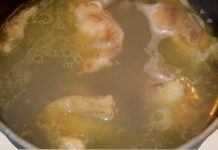After my father’s passing, I was summoned to the notary’s office to discuss his will. Given the financial struggles and debts that had plagued him in recent years, I anticipated little more than formalities. Our family home was on the brink of repossession, and I had resigned myself to the loss. However, during the meeting, the notary revealed an unexpected bequest: a house I had never known existed. Perplexed and curious, I decided to visit this mysterious property.
The following day, I embarked on a journey to the address provided. The route was scenic, with trees adorned in autumn hues lining the winding road. Upon arrival, I was greeted by an old yet well-maintained house. Its large windows gleamed in the sunlight, and a freshly painted porch contrasted with the moss-covered roof, giving it a quaint, storybook appearance. Despite its charm, an inexplicable unease settled within me.

Approaching the front door, I attempted to use the key given by the notary, only to find that it didn’t fit. Puzzled, I moved to peer through a window, hoping to glimpse the interior. At that moment, the door swung open abruptly, revealing a woman in her sixties with sharp features and a stern expression. She demanded to know my business.
I introduced myself and explained that, according to my father’s will, I had inherited the house. The woman’s demeanor softened slightly as she invited me inside to discuss the matter. The interior was cozy, filled with personal touches that suggested someone had been living there for quite some time.
Over a cup of tea, the woman introduced herself as Margaret. She revealed that she had been my father’s partner for the past decade, a fact he had kept hidden from me. They had shared the house together, and she had no knowledge of his intention to bequeath it to me. Margaret explained that my father had purchased the property years ago as a retreat from the stresses of life, a place where he could find peace.
As we delved deeper into conversation, Margaret shared stories of my father’s life that I had never known. She spoke of his love for gardening, his penchant for classical music, and his dreams of writing a novel. These revelations painted a picture of a man I realized I barely knew, a man who had sought solace in a life separate from the one we shared.
Margaret also disclosed that my father had been battling a terminal illness, a fact he had concealed from me to spare me pain. He had spent his final days in the house, with Margaret by his side, finding comfort in the tranquility it offered.
Feeling a mix of emotions—betrayal, sadness, and understanding—I realized that the house represented a part of my father’s life that he had kept hidden, perhaps out of a desire to protect me or to preserve his own sense of independence. Margaret and I discussed the future of the house, acknowledging that it held significance for both of us.

In the end, we agreed to share the property, honoring my father’s memory by maintaining the sanctuary he had cherished. Through this unexpected inheritance, I not only discovered a side of my father I had never known but also gained a connection with Margaret, who had been an integral part of his life. Together, we vowed to keep his spirit alive within the walls of the house, finding solace in the shared memories and the new bond we had formed.
This experience taught me that even those closest to us can harbor secrets, not out of deceit, but out of a complex web of emotions and intentions. It reminded me of the importance of open communication and the need to embrace the complexities of human relationships. Ultimately, the house became a symbol of reconciliation and understanding, bridging the gap between the known and the unknown facets of my father’s life.












